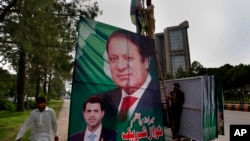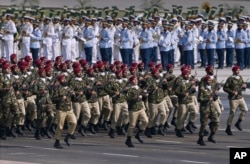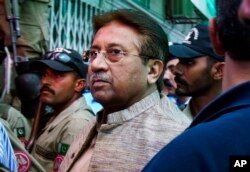The removal of Pakistani Prime Minister Nawaz Sharif has opened the door for opportunity and potential peril — in the country's foreign policy, specifically in dealing with Afghanistan, India and the United States.
Some experts believe that Sharif, who was disqualified and removed from office on corruption charges in a case dubbed the Panama leaks, challenged the powerful military establishment at a time when the U.S. is pondering a new strategy for the volatile region.
"While the Panama leaks were fortuitous, Mr. Sharif's crime seems to be the same this time around: crossing the military by pursuing conciliatory policies toward India as well as Afghanistan and by reportedly demanding that Inter-Services Intelligence end its use of militant groups as tools of foreign policy," University of Oklahoma professor Aqil Shah wrote in The New York Times.
Shah told VOA that Sharif issued statements at the start of his tenure that Pakistan would not interfere in Afghanistan`s internal issues, but he backed off under constant pressure from the military establishment.
Military, civilian contest for power
There is a serious battle going on, mostly under the surface, between civilians and the military contending for control of Pakistan's foreign policy. An article last October in Dawn, one of Pakistan`s most popular English-language newspapers, exposed the complicated and fragile nature of the civil-military relationship. It said the civilian government had warned the military in a high-level meeting to act against militants or be ready to face international isolation.
Pakistan has a long history of the military overthrowing civilian's governments: The General Ayub Khan coup in 1958, General Zia-ul-Haq's overthrow of Z.A. Bhutto in 1977, and General Pervez Musharraf's ouster of Sharif in 1999 all contained similar tactics employed by the military rulers after taking office.
Not a single elected prime minister has been able to complete five years in the office. Analysts see the powerful military establishment as the major factor behind weak demarcated governments, and the specter of another military takeover looms large.
Afghanistan and India both want Pakistan to get tougher on militants; both neighbors want a civilian government to take control of foreign policy and to be able to negotiate peace.
The entire region wants to see India and Pakistan reduce their bilateral tensions, given that they've fought three wars and have enough nuclear weapons to level the subcontinent. Fostering cooperation to battle terrorism would reduce the possibility of Afghanistan falling back into the type of disarray that flourished under the Taliban.
Military has mistrusted Sharif
In his second term as prime minister — the first was ended by the military coup that brought Musharraf to power — Sharif wanted to improve Pakistan's relationship with India. But that desire, and the push to take back control of foreign policy, concerned the country's security agencies.
"This mistrust between Sharif and the military is a recurrent story of Pakistan's contemporary politics," according to Raza Rumi, a lecturer at Cornell University and Ithaca College in the United States. "Sharif was fired by the military establishment twice in the 1990s, on charges of corruption. After his ouster in the 1999 coup, Sharif was exiled [but] he returned to Pakistan after nearly a decade.
"His key difference with the military commanders concerns India policy," Rumi wrote in a column for the website of German broadcaster Deutsche Welle.
Pakistan's military is very sensitive when it comes to India; the Kashmir issue is still unresolved and has kept the prospect of conflict high since independence in 1947.
"In May 2013, after his electoral victory, Nawaz Sharif said something that for years, no Pakistani leader had dared to express. Sharif told me, 'Civilian supremacy over the military is a must. The prime minister is the boss, not the army chief,'" Indian journalist Burka Dutt wrote in The Washington Post.
Can any civilian be 'the boss'?
Malik Siraj Akbar, a freelance journalist based in Washington, agrees with Dutt that Sharif tried to become the "boss." However, Akbar said he cannot envision any civilian government in Islamabad taking back its authority from the security agencies.
"Most of Pakistan's neighbors already know that the army and intelligence agencies — mainly the ISI — decide and dictate Pakistan's foreign policy. This comes as a reiteration of their fears that no civilian government in Pakistan can break the status quo," Akbar said. Afghanistan accuses ISI of supporting the Taliban.
In the last four years under Sharif's leadership, Afghan officials constantly accused Pakistan of providing safe havens for terrorists. The Pentagon also has periodically accused Pakistan of not being aggressive enough against terrorist groups, recently withholding $50 million in military assistance to Pakistan.
"While Nawaz Sharif was somewhat interested in advancing peace with India, he didn't have an independent policy toward Afghanistan. He mainly depended on the military's narrative, interpretation and strategy with respect to dealing with Afghanistan," Akbar added.
"Afghanistan, for Pakistani policymakers, poses a more complex foreign policy challenge, since dealing with Kabul also means dealing with the Taliban, America and India."
Many Afghans are pessimistic about the chances of improved relations with Pakistan following Sharif's ouster. Former U.S. ambassador to Afghanistan Zalmay Khalilzad wrote in a tweet: "Sharif's resignation will not impact Pakistan foreign policy, as the military's control will continue."






